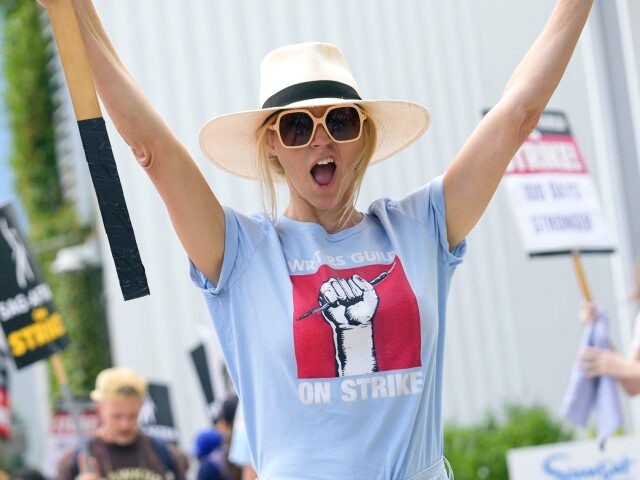NEW YORK (AP) — TV late-night comedy scribe Greg Iwinski, 38, was still only an aspiring writer when Hollywood writers held their landmark strike in 2007-2008.
But as he manned the picket lines Wednesday — the day the current strike hit its 100th day, matching the length of the previous one — he was keenly aware of all the history involved.
“I got a residual check yesterday for a show I worked on, because people went on strike in 1960, before I was even born,” he said. “And so knowing that we could be doing that for people 60 years from now is incredibly motivating.”
And yes, said Iwinski, who has written for “The Late Show with Stephen Colbert,” “Last Week Tonight with John Oliver,” and other shows, 100 days is a long time — but he is prepared to strike as long as it takes.
“Today is our 100th day of striking and we’re striking for the same thing we were on Day One, which is a fair contract,” he said. “We have the same two pages of proposals and the studios have not yet responded to all those proposals … so I guess until that happens, we’ll still be out here.”
Wednesday’s milestone comes as the U.S. film and television industries remain paralyzed by dual strikes by its actors and screenwriters. There’s no foreseeable end — a negotiating session last week involving Hollywood studios and streamers and the striking writers ended with little progress. Television networks are a month away from starting a new fall season, and broadcasters have already put contingency plans in place for programming that excludes their most popular scripted series.
Hollywood’s actors began their strike July 14, creating the first dual strike since 1960. Issues at play for both unions include the use of artificial intelligence and residuals related to streaming.
The Writers Guild of America held special pickets marking the 100th day in both New York and Los Angeles. Outside the Netflix offices on Broadway in Manhattan, the scene had an upbeat feel. A steady stream of protesters — both writers and their actor allies in SAG-AFTRA — danced, pounded on drums and chanted slogans as they marched around the city block.
Befitting writers, signs were markedly creative: “This Barbie is striking!!!” “Not Kenough.” “The only free writing you deserve is this sign.” “Writers make people happy (and sad).” And the simple: “No wages, no pages.”
Nicole Conlan, a striking comedy writer for “The Daily Show,” said that despite being on strike since May 2, she’s been so busy organizing on the picket lines that “I woke up today, the 100th day, and it feels like we’ve just started.”
“We don’t want to be out of work,” said Conlan, 33, “but the mood is very high because we still have all this support after 100 days. Compared to previous strikes, it really feels like people understand what we’re doing and people still are really throwing their support behind us.”
“The things that we’re fighting for apply not just to the industry but to the entire economy,” Conlan said. “In every industry people can see Wall Street and tech finding a way to make careers into gig jobs — so even though we do a very weird kind of job, writing, it’s easy for the layperson to see our jobs becoming gig jobs, and to see how that applies to their job as a nurse, or as a flight attendant, or as a construction worker.”
Vicki Winters, a standup comic who was picketing alongside the writers, played the drums as her colleagues marched. “Corporate greed has got to go,” said Winters, 66. “They are taking advantage of the workers of the Screen Actors Guild, the Writers Guild, pretty much every worker that’s at the ground level … while billionaires, millionaires choose a number they pull out of the air, like ‘I’m going to pay myself $11 million,’ and meanwhile the guy downstairs is going to make $7.25 an hour.”




